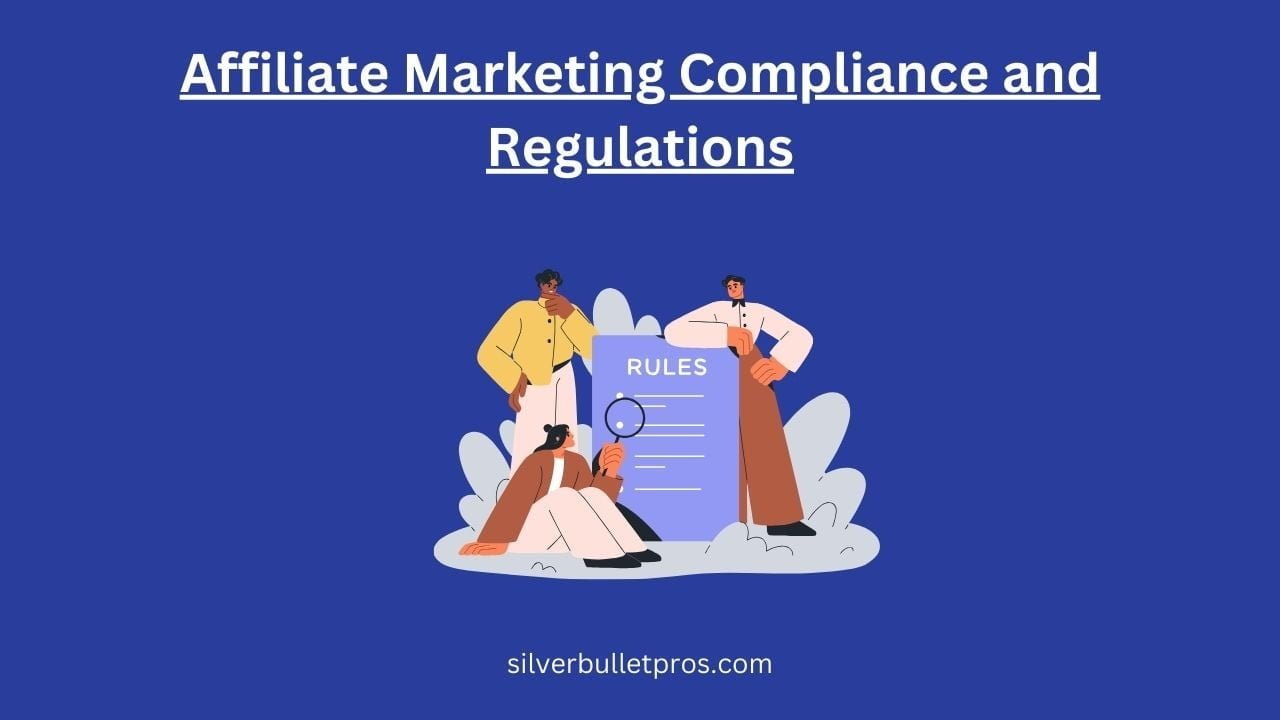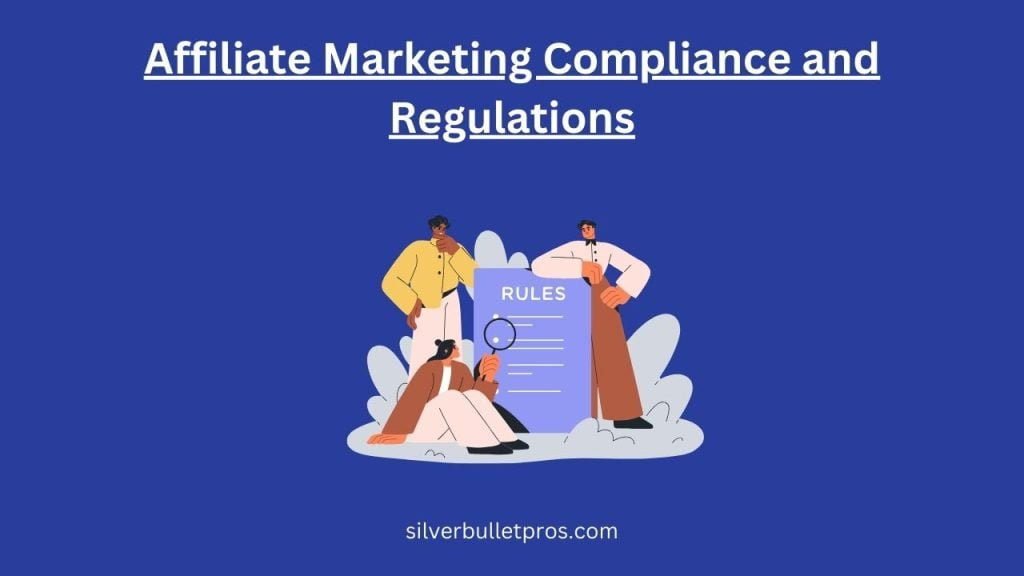

Title: Affiliate Marketing Compliance and Regulations
Affiliate marketing involves promoting other companies' products or services in exchange for a commission. But it's really important to follow the rules so you stay out of trouble. Let me explain why compliance matters and what regulations you need to know about. To do affiliate marketing properly, you must comply with advertising disclosure rules and other legal requirements. Failing to do so can result in hefty fines, lost affiliate account access, or even lawsuits. In this comprehensive guide, we'll explore the key compliance considerations for affiliate marketers, explain the major laws and guidelines, and share best practices to keep your affiliate business above board.
Why Is Compliance Important in Affiliate Marketing?
There are 3 main reasons why affiliate marketing compliance is crucial:
- Protect consumers from deceptive practices that could mislead them into purchasing something under false pretenses.
- Maintain transparency and trust with your audience by being upfront about your affiliate relationships.
- Avoid penalties like fines, account suspensions, or lawsuits from regulatory bodies and affiliate networks.
Complying with the rules safeguards your reputation, audience trust, and the long-term viability of your affiliate business. It's simply not worth the risks to cut corners.
What Are The Key Laws and Regulations For Affiliate Marketing?
The main laws and guidelines governing affiliate marketing practices aim to prevent unfair and deceptive marketing tactics. Some key ones include:
- FTC Endorsement Guidelines in the United States
- GDPR data privacy regulations in the European Union
- PECR privacy rules in the United Kingdom
- UCPA rules against unfair business practices in many countries
Affiliate marketers must understand and adhere to these requirements, which we'll explore in-depth later. But first, let's look at how to comply.
Consequences Of Non-Compliance
The consequences of violating affiliate marketing regulations can be severe:
- Financial penalties: Regulatory bodies can impose heavy fines for violations, easily reaching thousands or millions of dollars.
- Reputational damage: Your credibility and audience trust will suffer, potentially crippling your business long-term.
- Legal issues: You could face lawsuits from regulators, affiliate networks, or companies whose products you promoted non-compliantly.
- Account suspensions: Affiliate networks and programs will terminate your account if you violate their terms.
The risks simply outweigh any perceived benefits of non-compliance. Protecting your business requires adhering diligently to the rules.
What Are The FTC Guidelines For Affiliate Marketing?
The Federal Trade Commission's Endorsement Guides provide the key rules for affiliate marketing compliance in the United States:
- Disclose affiliate relationships clearly and conspicuously before providing an endorsement.
- Do not make misleading claims about a product's benefits, performance, efficacy, etc.
- Obtain appropriate evidence to support objective product claims before endorsing.
- Disclose incentivized endorsements if you received anything of value to promote.
- Honor “Keep” disclosure requirements for freebies exchanged for endorsements.
Adhering to the FTC guidelines is critical for U.S. affiliate marketers to avoid deception claims and steep penalties.
What Are The EU Affiliate Marketing Regulations?
In the European Union, the key affiliate marketing regulation is the General Data Protection Regulation (GDPR):
- Requires consent for using personal data for marketing
- Mandates privacy disclosures on data collection and usage
- Grants rights for individuals to access/delete their data
- Imposes hefty penalties for non-compliance up to €20 million
The GDPR aims to protect EU citizens' data privacy rights. As an affiliate, you must follow the rules on data handling and consent, especially visitor tracking.
What Are The UK Affiliate Marketing Regulations?
The United Kingdom has its own requirements in addition to GDPR:
- Privacy and Electronic Communications Regulations (PECR) – Restricts online tracking and direct marketing communications
- Consumer Protection from Unfair Trading Regulations (CPRs) – Prohibits misleading actions or omissions that could influence purchasing
- The UK Code of Non-broadcast Advertising (CAP Code) – Rules related to disclosing affiliate/advertising relationships
UK affiliate marketers must comply with PECR consent rules for electronic marketing and cookies, CPR prohibitions on deception, and CAP disclosures.
What Are The Best Practices For Affiliate Marketing Compliance?
To stay compliant as an affiliate marketer:
- Provide clear affiliate disclosures on your website, social media, and any promotional channels.
- Properly disclose incentivized content, such as product reviews of free samples.
- Avoid deceptive marketing claims about products or services you promote.
- Obtain consent for electronic marketing under PECR/GDPR as applicable.
- Follow data privacy requirements for visitor tracking and email marketing.
- Review affiliate program terms and ensure you operate within their guidelines.
- Leverage affiliate disclaimer generators to create compliant disclaimers.
- Consult legal counsel if you have specific compliance concerns.
Prioritize transparency and honesty in all your marketing efforts. It protects your business and reputation.
How To Avoid Unfair Marketing Practices
To steer clear of unfair, misleading, or deceptive marketing practices:
- Do not make false claims about a product's characteristics, benefits, efficacy, etc.
- Substantiate objective claims with sufficient evidence and data.
- Disclose limitations and risks so consumers understand the full picture.
- Represent affiliations accurately and conspicuously disclose incentives.
- Never use unfair tactics like high-pressure sales, harassment, or misleading pricing.
- Avoid disparaging competitors through false statements or unfair comparisons.
Essentially, be ethical, honest, and transparent in all your promotional efforts as an affiliate.
What Is Affiliate Marketing?
Affiliate marketing involves promoting a company's products or services on your platform (website, blog, social media, etc.) and earning a commission on any sales generated through your unique affiliate tracking link.
As an affiliate, you connect merchants/advertisers with potential customers in your audience. If someone clicks your link and makes a purchase, you get paid a percentage of that sale.
What Is The History Of Affiliate Marketing?
The roots of affiliate marketing date back to the 1990s with the rise of e-commerce and the Amazon Associates program launch in 1996. It allowed website owners to earn referral fees for directing traffic to Amazon.
As the internet boomed, more retailers saw the power of affiliates for expanding reach and driving sales at lower acquisition costs compared to traditional advertising.
Major affiliate networks like Commission Junction (1998) and LinkShare (1996) emerged to connect merchants with publishers at scale across numerous industries.
By the 2000s, affiliate marketing proliferated as a monetization method for bloggers, influencers, review sites, and more. Its popularity continues growing rapidly today.
What Are The Types Of Affiliate Marketing?
While the fundamentals remain the same, there are different types/models of affiliate marketing:
- Pay-Per-Sale: Most common where you earn a percentage of any sales revenue generated.
- Pay-Per-Lead: Commission paid for each qualified lead like form submits or trial signups.
- Pay-Per-Click: You earn a small fixed amount per affiliate link click, regardless of outcomes.
- Influencer Affiliates: Social media personalities/creators offer sponsored endorsements.
- Review Sites: Entire sites dedicated to reviews tied to affiliate links for products/services.
The type used depends on the merchant's objectives and commission structures in place.
H4: What are the major laws and guidelines governing affiliate marketing practices?
The key laws and guidelines include the FTC Endorsement Guides in the US, GDPR in the EU, PECR and CAP Code in the UK, and regulations against unfair business practices like UCPA.
H4: How can affiliate marketers disclose their relationships transparently and compliantly?
Clearly disclose affiliate relationships and incentives before providing endorsements or reviews. Use conspicuous affiliate disclaimers on websites, social media posts, videos, etc.
H4: What are the potential consequences of non-compliance in affiliate marketing?
Consequences include heavy fines/penalties from regulators, account suspensions by affiliate networks, legal issues/lawsuits, and reputational damage that can cripple the business.
H4: How do affiliate marketing regulations differ between the US, EU, and UK?
The US focuses on the FTC's endorsement disclosure guidelines, the EU has GDPR data privacy rules, while the UK combines GDPR, PECR for electronic marketing consent, and CAP Code advertising disclosure requirements.
H4: What are some best practices for ensuring affiliate marketing compliance?
Best practices include clear affiliate disclosures, avoiding misleading claims, obtaining consent for tracking/marketing, following affiliate program terms, using disclaimer generators, and consulting legal counsel.